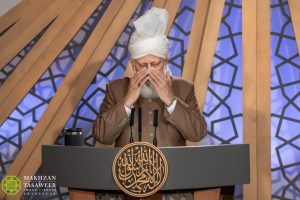
Translated into English for the first time by the Review of Religions translation team
Address delivered by Hazrat Mirza Bashiruddin Mahmud Ahmad (ra), 2nd Worldwide Head of the Ahmadiyya Muslim Communtiy, in Masjid Ahmadiyya, Sialkot on 12thSeptember, 1931
After reciting the Tashahhud, Ta’awwuz, and Surah Al-Fatihah, Hazrat Mirza Bashiruddin Mahmud Ahmad (ra) stated,
‘One of our friends has just recited a Ruku [a small section within a chapter] of the Holy Qur’an, the last verse of which states:
قُلۡ مَا یَعۡبَؤُا بِکُمۡ رَبِّیۡ لَوۡ لَا دُعَآؤُکُمۡ
[Say to the disbelievers: ‘But for your prayer to Him my Lord would not care for you.[i]]
Meaning that Allah the Exalted commands, ‘O my Messenger, proclaim to the people from Me that ‘Your Lord has no obligation to care for you, unless you continuously supplicate to Him.’’
If one contemplates over their existence, it will become evidently clear that God Almighty is in no need of mankind at all. Generally, people assume that they are doing God a favour by offering prayer (salat), giving charity, paying Zakat and performing Hajj (the pilgrimage). Consequently, it is often observed that whenever there is an affliction, ignorant people exclaim that they are at a loss as to why God Almighty has placed them through such a trial, even though they offer prayer (salat) and fulfil all other religious commandments as well. In other words, they feel in their hearts that they have been wronged by God Almighty.
The Promised Messiah (as) used to narrate that on one occasion a person’s son passed away and his friend went to visit him to offer his condolences. The grieving father wailed and cried, exclaiming, ‘God has been very cruel to me.’ It was as if he assumed that God Almighty had denied him of something that he was rightfully entitled to. However, one ought to ponder as to how one can possibly lay any claim over God? I am always left astounded by those who pride themselves over their prayers (salat), fasts, Zakat, Hajj (pilgrimage) and Taqwa (righteousness), but when they undergo a trial, they cry out that God has treated them unjustly. Whereas, a poet of India, who had a habit of drinking and was heedless of his faith, but despite his addiction of alcohol, he had a moment of truth dawn upon him in which he received a divine inspiration and uttered the following:
جان دی دی ہوئی اسی کی تھی
حق تو یہ ہے کہ حق ادا نہ ہؤا
‘Though I gave my life for Him, ‘twas His in any case; To speak the truth, I could not repay my dues to Him.‘
Moreover, whatever one loses, one should reflect where it originally came from. Ponder upon your own existence; is there anything that one can claim to be rightfully theirs? For instance, one claims to have a wife, but does he not contemplate where she originally came from? Likewise, there are children which one claims to be theirs, but again where do they come from? In the same way, house, property and all other assets, which are regarded as one’s possessions, where do they come from? If we deliberate over the reality of all our material possessions, it will become clear that these in fact are bestowed as a gift by God Almighty. The One, Who has granted all these things to us, has every right to take these back anytime He wishes. In reality, a gift is something that is never taken back; but everything granted to a person in this world, will be taken back eventually. This makes it clear that whatever a person is bestowed in this world, is merely temporary; and thus is not a gift in the true sense. It is the right of the owner, to take back whatever he has granted, as and when he wishes.
God Almighty states,
مَا یَعۡبَؤُا بِکُمۡ رَبِّیۡ لَوۡ لَا دُعَآؤُکُمۡ
[‘But for your prayer to Him my Lord would not care for you’[ii].]
After all, what does man think of himself and what is the true significance of his being for God Almighty to show care for him? Everything that exists in this world, ultimately leads to God.
اِلٰی رَبِّکَ مُنۡتَہٰٮہَا
[The ultimate knowledge of it rests with thy Lord.[iii]]
Thus, there is nothing and no living being, which does not ultimately link back to God Almighty. Since everything originates from God, were it not for His benevolence that He reaches out to man, what is man’s worth for God Almighty to even care for him?
لَوۡ لَا دُعَآؤُکُمۡ
‘But for your prayer to Him…’[iv].
This particular part of the verse has two meanings; firstly, it is with reference to God reaching out to man, secondly for man to supplicate to God. If the first meaning is taken, then this verse would mean that had God not made it incumbent upon Himself to reach out to us and grant us prosperity and progress, we would have achieved nothing. God, out of His benevolence, has taken it upon Himself to bestow these favours, otherwise as mere human beings, we have no right of our own.
In the latter meaning of this verse, it would signify that God Almighty does not care for us unless we bow down to God Almighty with humility and modesty, and supplicate to God Almighty that we have no entitlement to anything but if He were to Grant us out of His kindness, this would be a great favour upon us.
As a matter of fact, these are the two means through which one gains Taqwa (righteousness), progress and success. All the progress in this world is achieved through these two means.
Supplication does not mean that one merely raises their hands and prays, ‘O Allah! Grant me such and such progress.’ Or, by simply holding a Tasbeeh chain and counting the rosary beads whilst remembering God. Rather, supplication means that one effectively fulfils all those means necessary for its procurement. For example, in order to have children, the means established by God are that one ought to marry someone according to their choice. If, however, one fails to get married and yet prays to God Almighty for him to be granted children, then such a prayer will not be accepted. This is because the very essence of prayer is to first utilise all those necessary practical means which God Almighty has established for it. Thereafter, one ought to pray to God Almighty to be granted success.
For example, the government has issued money-order forms for the convenience of people, who wish to transfer money from one place to another. However, in order for this to happen, one must first fill out the required forms. This is a provision that the government has established for the benefit of the public to transfer money from one place to another. But if a person chooses not to avail from this system, and instead adopts a method of his own, for example, he places the money inside a book of poetry and gives it to the post office for it to be sent to such and such place. In such an instance, this individual will not be able to derive any benefit from the system established by the government. This is because the system of the government can only be of any help to him when he completes the prescribed money order form or any official postal documentation. Or, for example to file a case in the civil court, a particular fee has been set which must be paid. Suppose the court fee is set at 25 rupees and one fails to pay the fee, and instead burns a 50 rupees note, claiming that since he has spent twice as much money as required, therefore his case should be heard in the civil court. His request will be completely rejected because he has not followed the system established by the government to file a civil case.
Similarly, in order to achieve anything, Allah the Almighty has prescribed certain means and methods which are necessary to be adopted. There are prescribed means for seeking supplication, likewise for the moral training of children, for business and for employment, each has its distinct means. Among the methods set forth for prayer is that when one supplicates before God, He grants acceptance to their entreaties. In other words, when one utilises the prescribed means established by God for progress, God Almighty indeed grants accordingly.
We observe this example in the European nations. They studied different fields of knowledge and strove in excelling in research and new inventions. As a result, God Almighty granted them success in the secular world. This is a principle which God Almighty has established whereby hard work and endeavour can lead to novel discoveries of intricate matters. The people of Europe sought help from God Almighty through these very means, and in turn, God Almighty accepted their prayer [in the form of their efforts]. That is, they were granted sovereignty, wealth, fame, influence and glory. They were granted all of this because they adopted all those means prescribed by God Almighty. However, those who do not follow the prescribed methods, no matter how much difficulty they endure and how much they toil and struggle, they will not benefit from this. A street performer, who spends the entire day walking around parading his monkey to the public, indeed may work harder than a merchant, but does not earn as much as he does. What is the reason for this? This is because the street performer does not utilise those means outlined by God Almighty for earning wealth. Hence, one way to achieve progress in this world is that a person should call upon his God, in other words making appropriate use of the resources that God Almighty has provided for one’s worldly progress.
The second meaning of this verse is that had God Almighty not cared for man, how would he have fared? I have already explained the example of the people of Europe and the Hindus of the sub-continent that their calling upon God was in fact in reference to them making progress by utilising the full use of resources provided by God Almighty. In contrast, the example of God Almighty reaching out to man are His prophets. The Holy Prophet (sa) was unknown to the world and would worship in seclusion in the Cave of Hira, he had abandoned all the means that lead to worldly progress. However, an angel of God Almighty appeared before him and proclaimed, ‘Arise, for your God summons you.’ God Almighty took the Holy Prophet (sa) from being completely unknown and obscure and made him a king. He was granted such heights of success that his influence was ingrained across religions, nations, civilisations and societies. So much so that his ardent devotees excelled to become teachers in every field of knowledge, without ever having set foot in a university nor carrying out any experiments in laboratories. Whichever discipline they pursued; they reached the highest echelons.
A companion of the Holy Prophet (sa) narrates that he was given one Ashrafi (gold coin) to purchase a goat for sacrifice. He thought that for one Ashrafi in Madinah he will only get one goat whereas in a neighbouring village, he will be able to purchase two goats for one Ashrafi. Hence, he travelled to the nearby village and bought two goats for one Ashrafi. When he returned to Madinah, he met someone who enquired if he was willing to sell one of his goats to which he agreed. And so, he sold the goat for one Ashrafi. He then returned to the Holy Prophet (sa) and presented the goat and also the one Ashrafi. Upon enquiry, the companion narrated the entire incident to the Holy Prophet (sa). Noting his intelligence, the Holy Prophet (sa) prayed for him. Although the Arabs were not as skilled in trade as the Persians and Byzantines, however the companion states that owing to the prayer of the Holy Prophet (sa), even if he purchased dust, it would sell at the price of gold. He states that people would insist upon handing over their wealth to him for the purpose of trade and he would be left with no choice but to refuse them.[v]
This is the second interpretation of:
لَوۡ لَا دُعَآؤُکُمۡ
[‘But for your prayer to Him.’[vi]]
This does not include any individual skill or effort, rather this was God reaching out Himself, through which the Holy Prophet (sa) made immense progress and those who followed him also made tremendous progress along with him. Just like in the case of one who mounts a horse, his coat, trousers and other garments will also follow suit. The companions of the Holy Prophet (sa) scaled such heights of success that it is stated that Hazrat Abu Hurairarawas appointed the governor of a region. This was at the time when the Muslims gained victories and had acquired the riches of Chosroes. After the conquest, Hazrat Abu Huraira (ra) was given a handkerchief that Chosroes used to keep in his hand in the royal court as a form of embellishment. On one occasion, Hazrat Abu Huraira (ra) sneezed and cleaned his nose with that very handkerchief. At this, Hazrat Abu Huraira (ra) reminisced and said, ‘What a change of fortunes for you O Abu Huraira! There were days when you would faint because of extreme hunger and thinking you were suffering from a seizure; they would hit you over the head with slippers. Yet here you are today spitting in the handkerchief of Chosroes!’[vii]
Hazrat Abu Huraira (ra) accepted Islam at a much later time, only three years prior to the demise of the Holy Prophet (sa). To make up for this lost time, he had devoted every moment of his life to be spent in the mosque, so that he could listen to every word of the Holy Prophetsa. As a result of this, at times, he would miss up to seven consecutive meals. People would assume that he had eaten and would thus not enquire whether he had eaten. He would faint due to intense hunger, and assuming he was suffering from an epileptic fit, people would strike him on his head with slippers, as was the custom in Arabia in those days. Such was his previous condition, but his fortunes took such a turn that from this stage of abject destitution, he was granted a status whereby he was given the decorative handkerchief of the mighty Chosroes, which he later used to clean his nose with.
This is the second aspect of
لَوۡ لَا دُعَآؤُکُمۡ
‘But for your prayer to Him my Lord…’[viii].
When the Holy Prophet (sa) made progress, those associated with him were also bestowed with progress. Just like in the court of the Viceroy, even respected aristocrats and nobility are not allowed to attend without prior permission at times, but his servant can go there freely. In the same way, those who truly follow or form a bond with the prophets, experience tremendous success. Therefore, Allah the Almighty has commanded:
کُوۡنُوۡا مَعَ الصّٰدِقِیۡنَ
[‘…and be with the truthful.’[ix]]
This is because when the door (of success) is opened for the truthful, then those in their company are also ushered in.
Thus, to attain progress in this world, it is necessary that either a person strives to their utmost and exhaust their efforts; or otherwise forges such a strong bond with God Almighty that God Almighty, of His own accord, paves the path of his success.’
(Published in Al-Fazl, 27th September 1931)
[i]The Holy Qur’an, 25:78 [Author]
[ii]The Holy Qur’an, 25:78 [Author]
[iii]The Holy Qu’an, 79:45 [Author]
[iv]The Holy Qur’an, 25:78 [Author]
[v]The Companion’s name is Urwahra– Sahih Bukhari, Kitab-ul-Manaqib, Hadith no. 3642, published Dar-ul-Islam, Al-Riyadh, 1999 [Author]
[vi]The Holy Qur’an, 25:78 [Author]
[vii]Jami’ Tirmidhi, Abwaab Al-Zuhd & Sahih Bukhari, Kitab Ar-Riqab. [Author]
[viii]The Holy Qur’an, 25:78 [Author]
[ix]The Holy Qur’an, 9:119 [Author]




Add Comment